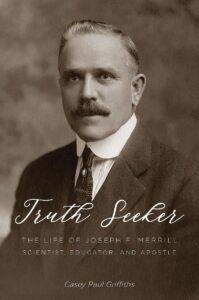Review
 Title: Truth Seeker: The Life of Joseph F. Merrill, Scientist, Educator, and Apostle
Title: Truth Seeker: The Life of Joseph F. Merrill, Scientist, Educator, and Apostle
Author: Casey Paul Griffiths
Publisher: RSC BYU Deseret Book
Genre: Biography
Year Published: 2021
Number of Pages: 347
Binding: Hardcover
Reviewed by Chad Curtis
I stumbled on Elder Merrill while I was digging up old conference talks on that mentioned the relationship of the Two Great Commandments, and was pleasantly surprised to find this scientist-apostle who seemed a paradox in terms of today’s political and religious alignments. Here was a man who in the same talk could condemn the CEO of a company paying poor wages as violating the second commandment, while dedicating a large portion of his talk about the evils of communism in Benson-style fashion. He might also give an entire talk citing scientific studies demonstrating the benefits of the Word of Wisdom and encouraging church members to eat less meat. I wanted to find out more about this apostle I had never heard about, and I was pleased to find this biography.
Merrill comes from a generation of church history many don’t really know a lot about. It’s not covered in seminary church history manuals, and your parents didn’t live through it, so it’s in this weird gap. Merrill was the son of a polygamist, and game of age while polygamy was being phased out. He was the first Mormon to obtain a PhD– from Johns Hopkins no less. He attended and taught at the University of Utah– and the book uncovers the tensions there in the “infidel factory” as he said others referred to it as at times. He was one a several scientist apostles of the era, including Widtsoe who was a fellow professor at the University. And I also found out he was the namesake of the engineering building where I went to school, so cool! It wasn’t engineering when he was there– he helped found the mining school, which was a large industry at the time.
A great example of faith, and a different model when there seems to have been more ways to be Mormon. Things seem to be much more uniform today, and part of that seems to have been working itself out in Merrill’s day. Merrill originally sponsored sending young people to theology training out of state. But when these graduates came back to teach at BYU and in seminaries, there was a movement of retrenchment, and hostility towards scholarship. This is most evidenced by J. Reuben Clark and his famous talk to church educators, but Merrill also seemed to have turned a page by that time, and aligned himself with Clark. Still, it is nice to have other models of what it is to be a Mormon, and I am eager to read similar biographies. I have read bios of High Nibley, Lowell Bennion, and Sterling McMurrin. I’m thinking of looking for a biography of N. Eldon Tanner next.
